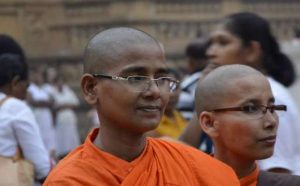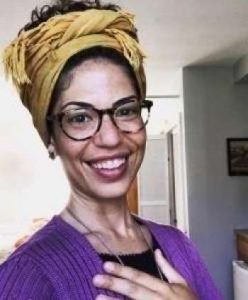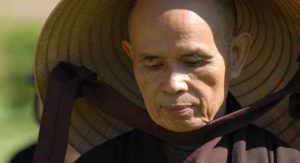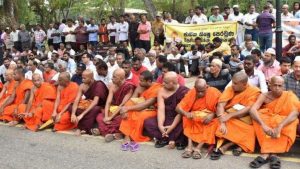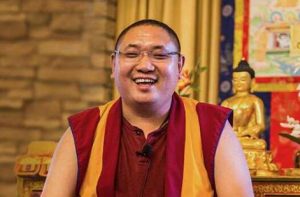
Jungto Society, the international Buddhist community founded by the revered Korean Dharma master and social activist Venerable Pomnyun Sunim (법륜스님), hosted an intensive eight-day study trip in South Korea in June for young leaders and activists affiliated with the International Network of Engaged Buddhists (INEB).
From 13–20 June, 19 Buddhist leaders from nine countries and territories in Asia—Bangladesh, Bhutan, Cambodia, China, Hong Kong, Laos, Myanmar, Thailand, and Vietnam—gathered in a warm and welcoming atmosphere of kalyana-mitrata* to practice, to learn, and to connect; to exchange ideas, to inspire, and to be inspired. BDG was privileged to join this unique assembly of monastic and lay practitioners, leaders and activists, to share a Dharmic journey that combined elements of study, experiential workshops, and field trips, with the discipline and commitment of a traditional Buddhist retreat.**
One of the female leaders attending this learning experience was Venerable Krisha Goutomi Bhikkhuni, who is a member of the modern wave of female monasticism in Bangladesh. Ven. Krisha Goutomi resides at Sanjibani Meditation Centre, a small monastery in the Chittagong Hill Tracts region of Bangladesh that is home to 11 indigenous ethnic groups, the majority of whom practice Theravada Buddhism. For decades, the region has been plagued by political and social tensions with Bangladesh’s Muslim-majority population.
Following her visit to Korea for the 2023 INEB Study Trip to Jungto Society, BDG sat down with Ven. Krisha Goutomi to learn about her path to becoming a daughter of the Buddha and her aspirations as a fully ordained monastic.
BDG: When and why did you decide to be ordained as a monastic? What were your motivations for taking this path?
Ven. Krisha Goutomi Bhikkhuni: I was on the verge of completing my education, just after the age of 25, when I realized that I didn’t want to pursue the normal lifestyle of most Bangladeshi women. Soon after meeting one of Bangladesh’s first bhikkhunis, I decided that I too would follow the path of Buddhism and become a bhikkhuni. She was highly educated and after meeting her, I realized that if she, as an educated and intelligent woman who was very good at her work, could leave it all behind and walk the Buddha’s path, then why shouldn’t I? That’s when I first decided that I would take the precepts.
BDG: How long did you spend preparing for this new life?
VKGB: Although I decided from a relatively young age that I wanted to follow the Buddha’s path, right around that time, in about 2004, the idea of female Buddhist monks in Bangladesh was a very radical one. So I maintained my lay practice from about 2004 until 2016, when Bangladesh saw the first five female monks receive full ordination in Bodh Gaya, India. When they returned to Bangladesh, I reached out to the five bhikkhunis and through them I was also eventually able to receive ordination.
BDG: Was that a very difficult process?
VKGB: During the initial stages, I encountered some difficulties because it was such a new idea in Bangladesh. Within general society, people were unaware that female monastics could exist, so acceptance was a bit of a problem because it was a totally new idea for most people. But there are some senior monks who have supported women seeking ordination and helped them along the way, and I took samaneri precepts in 2017. So the initial two to three years were quite hard. But women have been practicing and teaching the Dhamma with the help of some senior monks, and as a result it’s now much more normalized.
BDG: When was your full ordination ceremony?
VKGB: So the modern bhikkhuni lineage was established in Bangladesh, that was in 2016. There were five female monastics, and after they returned to Bangladesh, the second group women to take the precepts, of whom I was one, contacted them and received their assistance. I took the samaneri precepts on 2 January 2017. I received full ordination on 20 October 2022 here in Bangladesh.***
BDG: Did you encounter any unexpected challenges?
VKGB: I think there are two main factors I can talk about here. The first is my personal struggle. It was quite difficult for me to convince my family to accept my decision to take this path. At that time, it was still a very unconventional decision in the eyes of mainstream society. And in any case, it’s not unusual for family members to be reluctant to accept such a decision, because they would prefer to see you lead a normal life.
I have five siblings, and the way I managed to convince my father was by describing a potential scenario. I told him: “Look, you have three sons and two daughters. One of your daughters is married—you arranged a marriage for her and she’s doing well with that, and her husband is also good. They have their own children, but they don’t listen to their parents, and she sometimes feels sad that her children don’t want to listen to her. I don’t want to put myself in a similar situation. So if you arrange a marriage for me, I will marry if that’s what you really want me to do, but after marriage I won’t find any inner peace because the Buddhist path is the one that I’ve always wanted to take. So will you feel happy seeing your child suffer? Of course not. So it will be better if you let me follow the path I have chosen.” That’s how I convinced my father!
The second main challenge was the societal factor. Bangladesh is a Muslim-majority country, and Buddhists are a very small minority. We live in the Chittagong Hill Tracts, which in itself is a controversial issue, because this is where many indigenous minorities live. And since Bangladesh is a Muslim-majority country, with some considerable social and political tensions, it has been quite challenging for for us to establish ourselves as female Buddhist monastics.
However, in terms of our Buddhist practice and our day-to-day living, it’s not too problematic—we live quite far from the city, which is very good for a practice because it’s generally peaceful and quiet.
BDG: Can we say that, generally speaking, social acceptance for female monastics is much more favorable now?
VKGB: These days, the situation is much more normalized. If I compare it with the early years of female monasticism in Bangladesh, in those days many people would not feel confident about receiving teachings from bhikkhunis; they would wonder how they could have the proper knowledge, because they were accustomed to only seeing male monks teaching the Dhamma. Nowadays, people are much more accepting and I believe that this is because of the modernization of society and education, and a more widespread understanding of the Dhamma among the Buddhist community.
This morning, for example, as is the custom here, we were invited to a household to give a Dhamma teaching, and afterward we were served lunch. There were several male and female monks teaching together. So it’s clear that people generally are much more accepting.
BDG: What has been the most positive aspect of your monastic life?
VKGB: The most positive aspect for me has been personal satisfaction. Lay people often visit our monastery to seek advice about the personal problems they are experiencing. I’m happy to help them with advice, and I’m also grateful that I don’t have to experience those kinds of problems related to family, and so on.
Also, in the Theravada tradition we have to collect alms for our food and, in accordance with the tradition, we are satisfied with whatever we receive. As a result, we don’t have to think about what we are going to eat tomorrow, or where we’re going to eat, or whether we have enough money to take care of our children. So there is a peace of mind and sense of satisfaction that I received from being monastic, from the lack of time spent worrying about mundane concerns, and instead being able to focus my mind and my time on studying, teaching, and practicing the Dhamma.
BDG: How many people are in your monastic community?
VKGB: Right now, there are seven of us at Sanjibani Meditation Centre: five bhikkhunis and two samaneris, who are permanent residents. There also a few temporary lay residents who come and go. There’s one temporary volunteer who resides with us, and other people also sometimes come and go to work as volunteers.
BDG: Is the number of female monastics in Bangladesh is growing? Is there more interest among women?
VKGB: Right now, there are three female monasteries in Bangladesh with a total of 10 fully ordained female monastics and 12 samaneris who are on their way to full ordination. There’s quite a lot of interest in monastic life among Buddhist women in Bangladesh, but the problem from our side is that we’re not able to offer residence because of a lack of funding to build new residential buildings or a larger Dhamma hall.
BDG: So it’s practical difficulties that are the main obstacle at the moment?
VKGB: Yes, exactly. If we could receive more funding and more support, it would be a lot easier for more women to become monastics.
BDG: What are your aspirations for the future? Do you have any plans that you hope to accomplish?
VKGB: I do have some aspirations for the future. When I received ordination there were certain things that I wanted to accomplish. Right now, the number of female monastics in Bangladesh is slowly increasing and there are more women who are interested in this path. So I would like to be able to create an environment and the right circumstances under which more women can pursue ordination and practice the Dhamma.
During my time in Korea, we saw that female monastics there were running Dhamma schools, volunteering, practicing, and were involved in many different kinds of socially engaged work. I’d like to see female monastics in Bangladesh involved in the same kinds of things. If we consider the socio-economic conditions of the lay community in which I live, there are many people living below the poverty line. There are also orphaned children. I would like to be able to help these people and give these children somewhere to live and provide educational facilities for them. But because of the lack of funding and support, we’re not yet able to engage in such projects. Any support or funding that we do receive is local and very limited.
So this is what we would like to do. I’m currently talking with the other members of our sangha about ways that we might start moving toward this goal.

BDG: Is there anything else we haven’t touched on that you’d like to mention?
VKGB: Although many people come to us because they’re interested in taking precepts and in ordination and in practicing meditation, we lack adequate facilities at Sanjibani Meditation Centre, which was graciously donated to us by the King of Chakma Circle, His Majesty Raja Devasish Roy.**** The Queen of Chakma Circle, Her Majesty Rani Yan Yan, herself ordained as a samaneri for five days, taking the precepts on 10 April 2017, and has worked tirelessly to increase the recognition of ordained female monastics. We have a small Dhamma hall and some basic accommodation—in fact, it’s not even sufficient for the small number of us that are living there now.
Whenever we receive a large donation, we try to plan how to best use and make the most of the funds. A lot of women are coming to see us these days. They want to learn how to meditate and they want to take precepts and learn more about the Dhamma, and it’s very difficult for us to accommodate them all. It always comes down to funding. That’s the main problem we are facing.
BDG: Venerable Krisha Goutomi, thank you very much for sharing your time with us.
For more details about Sanjibani Meditation Centre in Bangladesh, or to support the work of Venerable Krisha Goutomi Bhikkhuni and her sangha, please email: [email protected] or [email protected]
With special thanks to Shailpika Chakma for her patient and accurate translation.
* Kalyana-mitrata (Skt.), Kalyaṇa-mittata (Pali); the Buddhist concept of virtuous spiritual friendship.
**** The leader of the Chakma indigenous ethnic group.
See more
Pomnyun
Jungto Society
International Network of Engaged Buddhists (INEB)
Related features from BDG
From Bhutan to Korea: Reflections of a Female Monastic on the Buddhist Path
Daughters of the Buddha: Progress on the Path of Female Ordination – A Conversation with Ven. Dhammananda Bhikkhuni
Daughters of the Buddha: Buddhism and Film with Ven. Daehae Sunim
Daughters of the Buddha: 18th Sakyadhita Conference in Seoul Celebrates the Sacred Feminine
Rebirth and Revolution – Engaged Buddhism in Japan: A Conversation with Jonathan Watts
Related news reports from BDG
US Department of State Honors Bangladeshi Social Activist Rani Yan Yan with 2023 Global Anti-Racism Champions Award
Living in a Precarious World: 18th Sakyadhita Conference Commences in Seoul
Jungto Society Marks the Birth of the Buddha With Gatherings in Seoul
Engaged Buddhism: INEB’s SENS Transformative Learning Program Holds Graduation Ceremony for 2023 Cohort
Bhutan Nuns Foundation Shares Updates on BNF Training & Resource Centre for Buddhist Nuns
Engaged Buddhism: 20th Biennial INEB Conference Concludes in South Korea with a Commitment to Action, Peace, and Change












